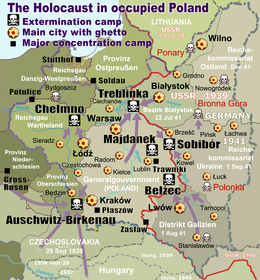Stanisławów Ghetto
| Stanisławów Ghetto | |
|---|---|

Tempel Synagogue in Stanisławów
before World War II Stanisławów location during the Holocaust in Poland |
|
| Location | Stanisławów, German-occupied Poland |
| Persecution | Imprisonment, forced labor, starvation, mass killing |
| Organizations | Schutzstaffel (SS) |
| Death camp | Belzec (see map) |
| Victims | 20,000 ghettoized Jews, and 10,000–12,000 before the Ghetto was set up, in Bloody Sunday massacre |
Stanisławów Ghetto (Polish: getto w Stanisławowie, German: Ghetto Stanislau) was a Jewish World War II ghetto established in 1941 by the Schutzstaffel (SS) in the prewar Polish city of Stanisławów in the south-eastern region of Kresy (now Ivano-Frankivsk, Ukraine) occupied by Germany after Operation Barbarossa. Before the joint Nazi-Soviet invasion of Poland in 1939 Stanisławów was the capital of the Stanisławów Voivodeship in the Second Polish Republic. The Soviets annexed the city to the Ukrainian SSR in 1939 along with the entire region, but renamed it as Ivano-Frankivsk in 1962, long after the war ended. In 1941 Stanisławów (then, Stanyslaviv) was overrun again, this time by the Wehrmacht army, in the course of the German attack on the Russian positions behind the Curzon Line (see map, marked in red), and incorporated it into their own Distrikt Galizien, as the fifth district of the Generalgouvernement.
On 12 October 1941 during the so-called Bloody Sunday, some 10,000–12,000 Jews were shot by the German uniformed SS-men from SIPO and Orpo together with the Ukrainian Auxiliary Police at the Jewish cemetery, into hastily dug mass graves. Dr. Tenenbaum of the Judenrat heroically refused the offer of exemption and was killed along with the others. The size of the massacre was unprecedented. Two months after that, the Stanislau Ghetto was established officially for the 20,000 Jews remaining, and sealed off with walls on 20 December 1941. Over a year later, in February 1943, the Ghetto was liquidated, when no more Jews were imprisoned in it.
...
Wikipedia

